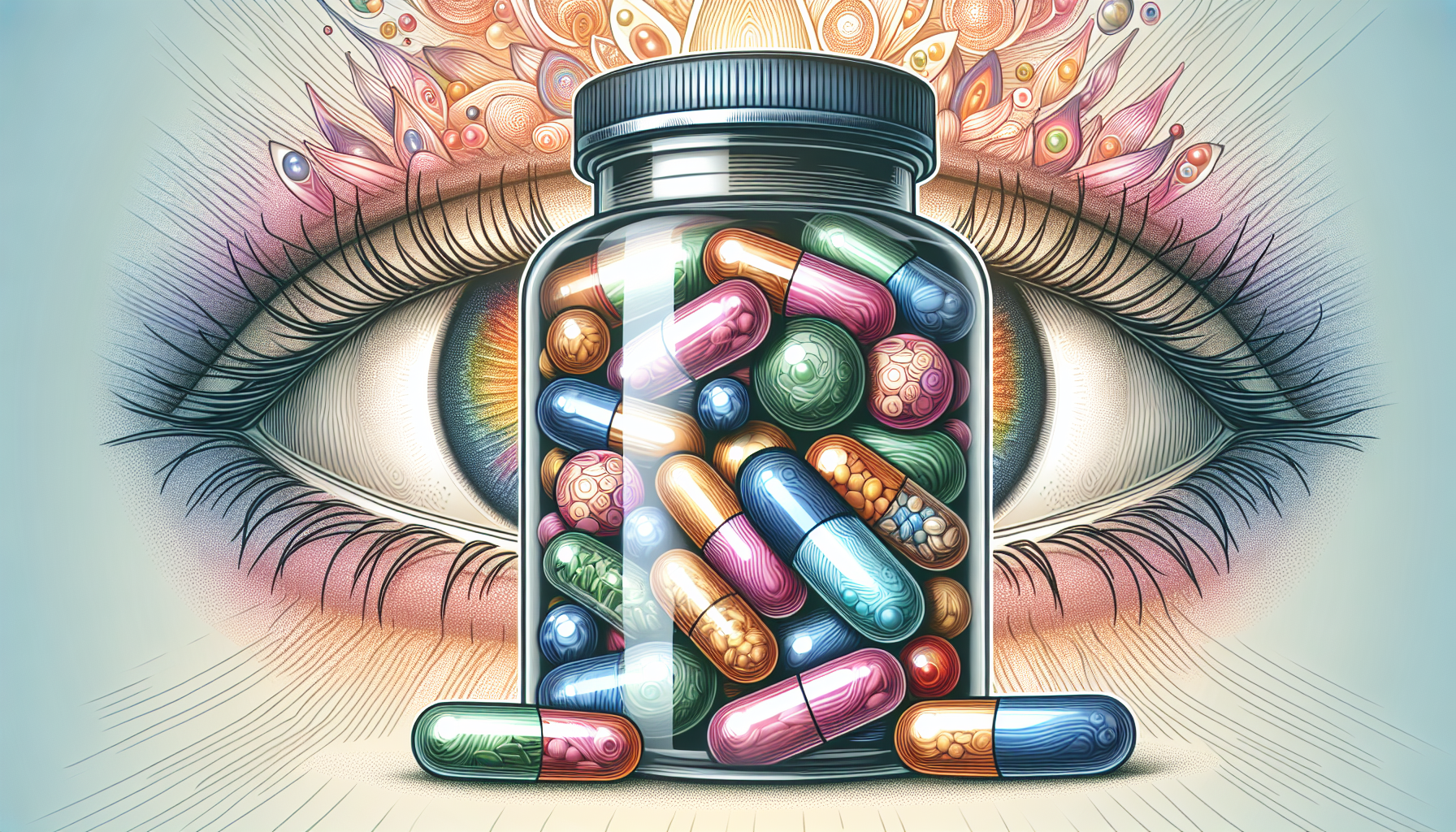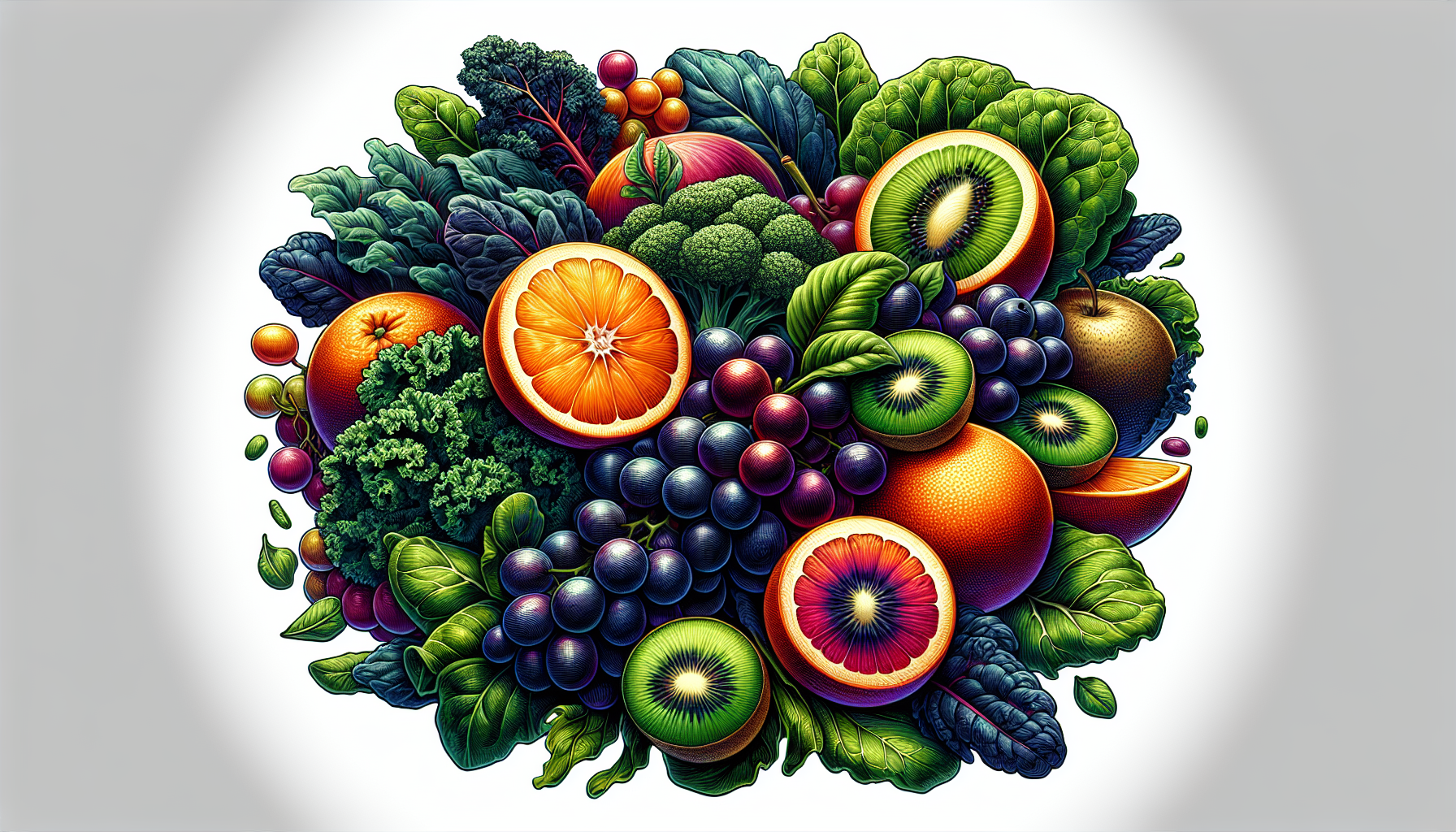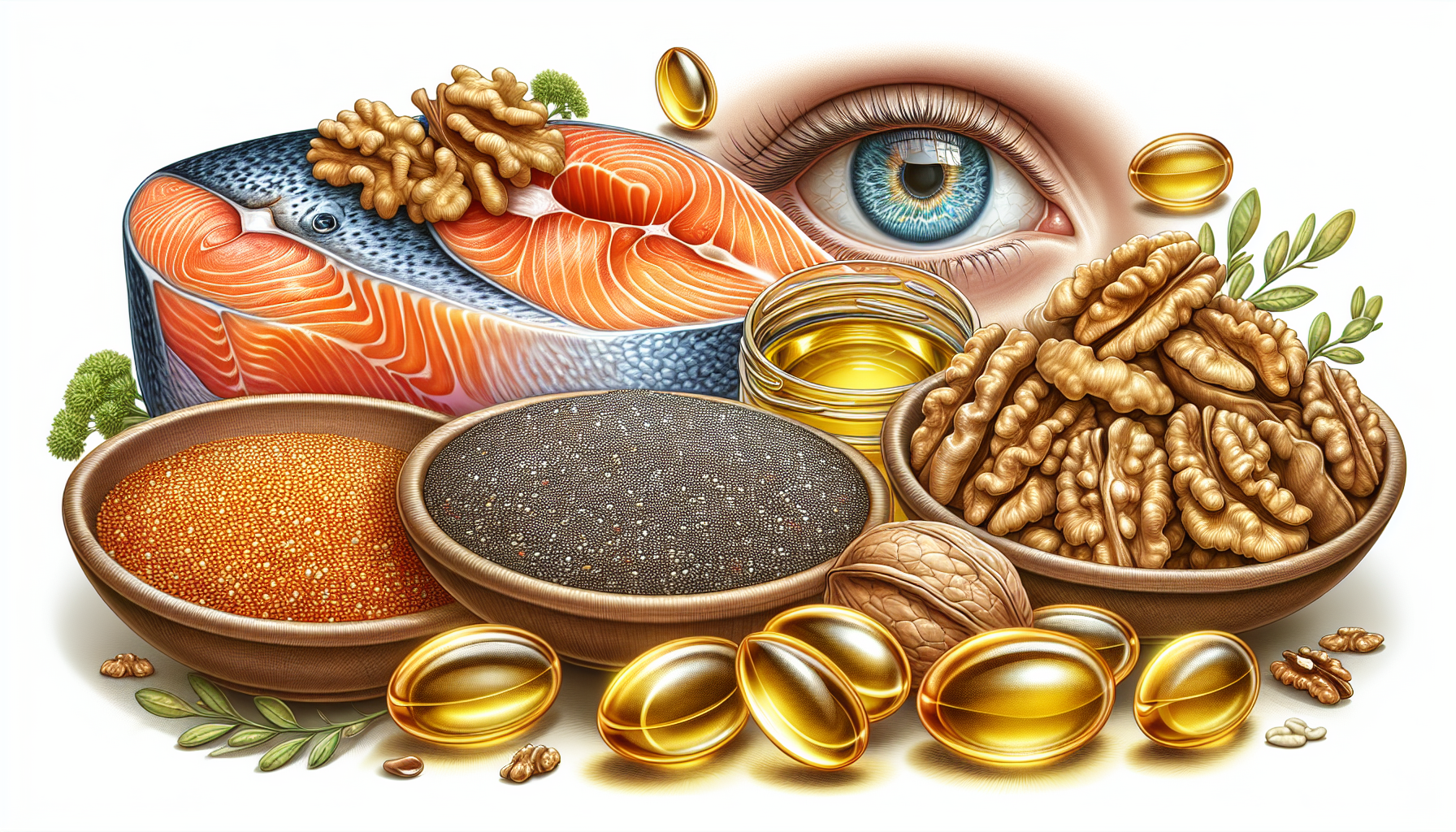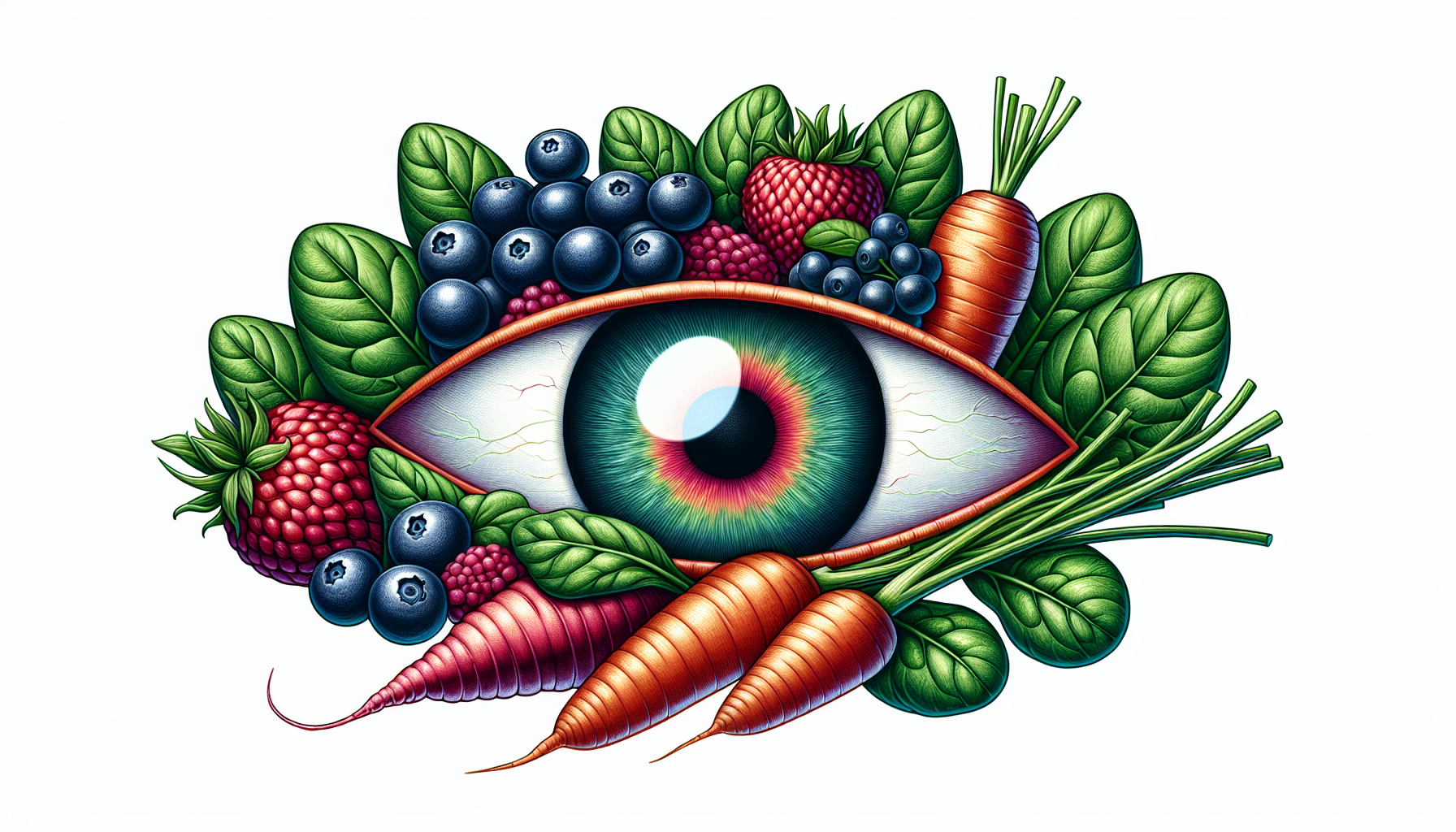Struggling to find the best supplement for eyesight improvement? You're not alone. With so many options on the market, it can be challenging to determine which supplements truly promote eye health and potentially prevent eye diseases like age-related macular degeneration (AMD), cataracts, and glaucoma. This guide covers a broad spectrum of eye health supplements, highlighting essential nutrients such as Vitamin A, Vitamin C, Vitamin E, Lutein, Zeaxanthin, and Omega-3 fatty acids. These nutrients have been shown to reduce the risk of various eye conditions and maintain optimal vision health.
Understanding the importance of nutritional supplements in filling dietary gaps is crucial. Evidence-based, third-party certified supplements like AREDS and AREDS2 are particularly recommended by the National Eye Institute for supporting eye health, especially in older adults at risk for AMD. Alongside a diet rich in green leafy vegetables and colorful fruits, these vision supplements can significantly reduce eye disease symptoms and promote overall eye health. The information we present here is a comprehensive guide to discovering which supplements can help improve your eyesight and how they can be integrated into a balanced, healthy lifestyle.
Key Takeaways
- Nutritional supplements are vital for filling dietary gaps, promoting eye health, and potentially preventing cataracts, glaucoma, and age-related macular degeneration (AMD).
- Key nutrients like Vitamin A, Vitamin C, Vitamin E, Lutein, Zeaxanthin, and Omega-3 fatty acids are essential in maintaining optimal eye health by reducing risks of various eye conditions.
- Evidence-based, third-party certified supplements such as AREDS and AREDS2, along with omega-3-rich supplements, are recommended for supporting eye health, particularly in older adults at risk for AMD.
Discover the Best Supplement for Eyesight Improvement

Nutritional supplements can be a game-changer in the quest for better vision. Eye health supplements can fill the nutritional gaps for those grappling with eye diseases or struggling to maintain a diet rich in vitamins and antioxidants. These supplements provide essential nutrients that promote eye health, potentially delaying or preventing common eye problems and diseases.
Prioritizing evidence-based options is key when selecting the right supplement. Look for third-party tested products certified by reputable organizations like USP, NSF, or ConsumerLab.com. This ensures the supplements contain what they claim and are free from contaminants. Reading labels carefully can help you identify the desired nutrients in vision supplements.
The risk of eye conditions such as cataracts, glaucoma, and age-related macular degeneration (AMD) can be increased by deficiencies in specific vitamins. Maintaining a balanced diet is vital for supporting eye health. Incorporating an eye health supplement into their diet can benefit older adults at risk for AMD. By addressing these deficiencies, certain supplements can improve overall eye health and potentially prevent vision loss.
The journey to better vision begins with understanding the right vision supplement for your needs. Whether you’re looking to support your vision through dietary supplements or seeking to prevent future eye diseases, the right choices can make a significant difference.
Introduction to Eye Health
To function optimally, our complex eyes require a variety of vitamins and nutrients. These nutrients are significant in maintaining eye health, like the fuel that keeps an engine running smoothly. In our fast-paced lives, ensuring our eyes receive these essential nutrients is more challenging yet important than ever.
Eye health supplements, including vitamin and mineral supplements, can be a valuable addition for individuals with eye diseases or those who find it challenging to maintain a vitamin-rich, well-rounded diet. Supplements improve eye health, but these are not a one-size-fits-all solution; certain populations may not benefit from them, underscoring the need for personalized advice.
Research has shown that proper nutrition can significantly influence your eyes' health. However, more research is needed to fully understand the impact of various supplements in the early and advanced stages of eye diseases. This underscores the importance of consulting with healthcare professionals to determine the best approach tailored to your needs.
Importance of Supplements for Eye Health
Nutrition plays a pivotal role in influencing the health of your eyes, acting as a foundation to mitigate factors that cause eye conditions. For instance, nutritional deficiencies can heighten the risk of developing conditions such as cataracts, glaucoma, and age-related macular degeneration (AMD). This is where eye health supplements step in, providing essential nutrients that promote eye health and potentially delay or prevent these problems.
For older adults, the risk of AMD becomes more pronounced. Nutritional supplements tailored for eye health can be particularly beneficial in such cases. These supplements can help maintain healthy eyes and support overall vision by ensuring an adequate intake of key vitamins and minerals.
Thus, the significance of eye health supplements cannot be overstated. They serve as a crucial tool in the preventive care of our vision, helping to fill dietary gaps and support the intricate needs of our eyes.
Essential Nutrients for Vision
Maintaining optimal eye health requires certain nutrients, including vitamins, carotenoids, and fats. These nutrients protect the eyes by reducing the risk of age-related macular degeneration (AMD) and other eye diseases. They play a crucial role in maintaining eye health. By understanding the role of these key vitamins and minerals, we can make informed decisions about our diet and supplements.
The specific nutrients vital for vision will be examined in the following subsections. From Vitamin A to Omega-3 fatty acids, each nutrient uniquely and critically supports eye health.
Vitamin A
When it comes to eye health, Vitamin A is a powerhouse nutrient. Found in orange-colored vegetables and fruits like sweet potatoes and carrots, Vitamin A is essential for keeping the eyes moist and aiding the retina in processing light. The primary source of Vitamin A in our diet is beta-carotene, a compound that the body converts into Vitamin A.
A deficiency in Vitamin A can lead to:
- Night blindness is a condition where it becomes difficult to see in low light
- Dryness in the conjunctiva
- Corneal ulcers, which can ultimately result in vision loss
Therefore, to maintain healthy eyes and prevent night blindness, it’s crucial to ensure an adequate intake of Vitamin A.
Vitamin C
Vitamin C is a potent antioxidant that protects the eyes from oxidative damage by neutralizing free radicals. This essential nutrient is found in citrus fruits and vegetables like red bell peppers and strawberries.
Vitamin C plays a vital role in maintaining eye health by reducing the risk of cataracts and slowing the progression of age-related macular degeneration.
Vitamin E
Vitamin E is another crucial antioxidant that helps maintain cell health, including the cells in your eyes. Its antioxidant properties prevent age-related macular degeneration (AMD), a common cause of vision loss in older adults. Foods rich in Vitamin E include avocados, almonds, and sunflower seeds, making it easy to incorporate this nutrient into your diet.
Vitamin E significantly contributes to overall eye health by:
- Protecting eye cells from damage caused by free radicals
- Ensuring an adequate intake of this vitamin can help promote eye health
- Preventing the onset of age-related eye diseases.
Lutein and Zeaxanthin

Lutein and Zeaxanthin are carotenoids found in plants and the retina. These nutrients increase density in the retina and absorb high-energy blue and ultraviolet light, protecting the eyes from harmful light exposure. Leafy green vegetables like kale and spinach are rich in these carotenoids, which are known to protect the macula, which is crucial for central vision.
Age-related macular degeneration (AMD) is the leading cause of vision loss in the United States, affecting more than 10 million people. Consuming foods rich in Lutein and Zeaxanthin or taking supplements can significantly reduce the risk of chronic eye diseases and support overall eye health.
If you're specifically interested in Lutein supplements, check out our article, "Nature's Eye-essential: The Five Best Lutein Supplements to Elevate Your Well-being."This detailed review covers five of the top Lutein and Zeaxanthin supplements available, providing valuable insights to help you choose the best option for your eye health needs.
Omega-3 Fatty Acids
Omega-3 fatty acids are crucial in visual development, retinal function, and overall eye health. These essential fats are concentrated in the retina and help protect it from damage and degeneration. Some sources of Omega-3 fatty acids include:
- Cold-water fish such as salmon and tuna
- Flaxseeds and chia seeds
- Walnuts
- Spinach and kale
Including these foods in your diet may help prevent eye diseases and alleviate dry eye symptoms.
Diets low in Omega-3 fatty acids are associated with conditions such as dry eye syndrome and retinopathy. Incorporating Omega-3-rich foods or supplements into your diet can support retinal health and reduce the risk of chronic eye conditions.
For our vegan and vegetarian readers, it's important to note that while plant sources like flaxseeds, chia seeds, walnuts, spinach, and kale provide alpha-linolenic acid (ALA), they do not directly offer the DHA and EPA found in fish oil. The body can convert ALA to DHA and EPA, but this conversion is inefficient. Fortunately, algae-based Omega-3 supplements provide the same DHA and EPA as fish oil, making them an excellent plant-based alternative. To learn more, check out our article, “From Algae to Awesomeness: Five of The Best Vegan Omega-3 Supplements You Need to Know.”
Recommended Supplements for Eye Health
Expert recommendations are invaluable when choosing eye health supplements. Prioritize evidence-based, scientifically grounded options that are third-party tested and certified by reputable organizations such as USP, NSF, or ConsumerLab.com. This ensures the supplements contain what they claim and are free from contaminants.
The following subsections will explore specific supplements recommended for eye health, including the AREDS and AREDS2 formulas, multivitamins with key nutrients, and fish oil supplements.
AREDS and AREDS2 Formulas
The Age-Related Eye Disease Studies (AREDS and AREDS2) conducted by the National Eye Institute have significantly influenced supplement recommendations for AMD and cataracts. Participants in the supplement group of the AREDS study lowered their risk of advanced stages of AMD by about 25%. They reduced their risk of vision loss due to macular degeneration by about 19%.
The AREDS2 supplement is now recommended for people with AMD, incorporating Lutein and Zeaxanthin for added benefits. Studies have shown the importance of specific nutrient combinations in promoting eye health and preventing vision loss. For more information, our referenced article above also lists a top-ranked AREDS2 supplement. Be sure to check it out for detailed insights and recommendations.
Multivitamins with Key Nutrients
Multivitamins are often studied for their potential benefits to eye health. While some studies have observed benefits, there is no confirmed effect on lowering the risk of cataracts. Nonetheless, multivitamins can provide a convenient way to ensure an adequate intake of essential nutrients.
Consulting a healthcare provider for personalized advice on using multivitamins for eye health is crucial. A tailored approach can help determine the best multivitamin to meet your needs and support overall vision health.
Fish Oil Supplements

Fish oil supplements are rich in Omega-3 fatty acids, crucial for various bodily functions, including eye health. Omega-3 fatty acids found in fish oil can help:
- Protect the eyes from AMD (age-related macular degeneration)
- Maintain overall eye health
- Improve moisture retention in the eyes, reducing the risk of chronic inflammation.
Omega-3 fatty acids have shown effectiveness in reducing symptoms of dry eye syndrome, which causes discomfort and vision issues. Incorporating fish oil supplements into your routine can be a beneficial step toward maintaining healthy eyes. And don't forget about the vegan form of Omega-3 fatty acids mentioned above.
Dosage and Safety Considerations
It is crucial to understand the recommended dosages for eye health supplements and their potential interactions with medications or health conditions. Age, sex, pregnancy, and lactation can influence the recommended dosage of eye health supplements. Therefore, consulting a healthcare provider before taking dietary supplements is essential to ensure they do not interfere with other medications.
The following subsections will explore the recommended dosages for key nutrients and potential interactions to be aware of.
Recommended Dosages
The recommended dietary allowance for Vitamin C is 90 mg for men and 70 mg for women, increasing to 85 mg during pregnancy and 120 mg for breast-feeding. For Vitamin E, the recommended dietary allowance is 15 mg for teens and adults, increasing to 19 mg during breast-feeding. It’s important not to exceed 100% of the Daily Value for each vitamin.
These dosages provide a general guideline, but individual needs may vary. Always consult a healthcare provider for personalized dosage recommendations based on your health needs.
Potential Interactions
When considering a supplement, reviewing the ingredient list and nutrition facts panel is essential. This helps understand the ingredients included and their quantities in relation to the recommended daily value. This helps in reviewing potential interactions with other supplements and medications.
People with or at risk for age-related macular degeneration (AMD) should ask their doctor if they should take high-dose vision supplements. High-dose antioxidant supplements can be harmful; for example, beta-carotene can increase the risk of lung cancer, and Vitamin E can increase the risk of hemorrhagic stroke. Certain medications can also interact with nutrients important for eye health, so it’s crucial to consult with your doctor to ensure safety.
Foods vs. Supplements
Supplements should not replace a healthy diet despite their ability to provide essential nutrients. Antioxidants are most beneficial when consumed organically from fruits, vegetables, and whole foods rather than supplements. A well-balanced diet rich in fruits, vegetables, and fish like salmon and tuna can help maintain eye health.
Now, let's compare the benefits of consuming antioxidant-rich foods versus supplements for eye health.
Antioxidant-Rich Foods

Consuming antioxidant-rich foods is crucial for maintaining eye health and preventing age-related eye diseases. Leafy green vegetables like kale, spinach, and Swiss chard are rich in lutein and zeaxanthin, which help protect the eyes from oxidative stress. These antioxidants promote eye health by neutralizing free radicals and reducing the risk of chronic eye diseases.
Colorful fruits such as:
- raspberries
- papaya
- peaches
- mangoes
are chock-full of eye-healthy carotenoids, contributing to better vision and overall eye health. Incorporating various vibrant fruits and vegetables into your diet can significantly enhance your eye health and reduce the risk of vision loss.
Incorporating Nutrient-Dense Foods
Eating various nutrient-rich foods can help you get all the vitamins and minerals necessary to maintain good eye health. This balanced diet often provides adequate amounts of these essential nutrients. Foods such as leafy green vegetables, orange vegetables like carrots and sweet potatoes, eggs, and cantaloupes are excellent sources of Vitamin A, essential for eye health. The Mediterranean diet, which includes green leafy vegetables, colorful fruits, nuts, seafood, and olive oil, may help reduce the risk of age-related macular degeneration (AMD).
Incorporating these nutrient-dense foods into daily meals supports eye health and overall well-being. A balanced diet and regular consumption of antioxidant-rich foods can significantly promote healthy eyes and prevent eye diseases.
Lifestyle Tips for Maintaining Healthy Eyes
Maintaining healthy eyes involves more than just diet and supplements. Adopting various lifestyle habits can help prevent eye diseases and improve overall health. A diet low in fat and rich in fruits, vegetables, and whole grains benefits heart and eye health by supporting the tiny arteries supplying oxygen and nutrients to the eyes. Regular exercise is also crucial, as it helps maintain a healthy body weight, reducing the risk of diabetes and related vision problems.
The following subsections will explore specific lifestyle tips for protecting your eyes from light exposure and the importance of regular eye exams.
Protecting Eyes from Light Exposure

Protecting your eyes from harmful light exposure is essential for maintaining eye health. Wearing proper sunglasses year-round can protect your eyes from harmful UV rays. Look for sunglasses that block 99% to 100% of UVA and UVB radiation to ensure maximum protection. Additionally, adopting the 20-20-20 rule, which involves looking 20 feet away for 20 seconds every 20 minutes, can reduce eye strain from screens.
These simple steps can significantly reduce the risk of developing cataracts and other eye diseases caused by light exposure.
Regular Eye Exams
Regular eye exams are crucial for detecting and addressing vision and health concerns. Early detection of eye diseases through regular exams can prevent vision loss and improve treatment outcomes. Eye exams can also reveal other health issues, such as high blood pressure and diabetes, which can affect eye health.
Regular check-ups with an eye doctor are essential for maintaining healthy eyes and overall health. Here are some guidelines for when to have an eye exam:
- Children should have at least one eye exam between ages 3 and 5 to detect amblyopia, also called lazy eye, or other risk factors.
- People with diabetes are advised to have a dilated eye exam every year.
- Individuals at higher risk for glaucoma should have a dilated eye exam every 2 years.
Wrapping Up On Supplements for Eyesight Improvement
In summary, maintaining eye health requires a holistic approach encompassing a balanced diet, appropriate supplements, and healthy lifestyle habits. Essential nutrients such as Vitamins A, C, and E, Lutein, Zeaxanthin, and Omega-3 fatty acids are critical in supporting vision and preventing eye diseases. Eye health supplements, including the AREDS2 formula recommended by the National Eye Institute and fish oil, can provide significant benefits, especially for those at risk of age-related macular degeneration (AMD). It's important to note that while supplements improve eye health, they are not a substitute for a diet rich in antioxidant-rich foods and nutrient-dense items. Incorporating green leafy vegetables, colorful fruits, and other key vitamins into your daily meals can enhance eye health and support overall well-being.
Regular eye exams and protecting your eyes from harmful light exposure are vital in maintaining healthy vision. Consulting with a primary care doctor about the best supplement for eyesight improvement can provide personalized guidance. Additionally, avoiding high doses of certain supplements and ensuring a varied diet rich in essential antioxidants and mineral supplements can promote eye health. By taking these proactive steps, including using vision supplements and maintaining a healthy lifestyle, you can enjoy better vision and reduce the risk of eye diseases, such as cataracts, night blindness, and vision loss associated with advanced AMD.
Some Brief Answers to FAQs
What are the best supplements for eye health?
For optimal eye health, consider taking supplements like the AREDS2 formula, multivitamins with key nutrients, and fish oil supplements with Omega-3 fatty acids. These have been scientifically tested.
How can I protect my eyes from harmful light exposure?
To protect your eyes from harmful light exposure, wear sunglasses that block 99% to 100% of UVA and UVB radiation and follow the 20-20-20 rule to reduce screen time. This will help safeguard your eyes from potential damage.
How often should I have an eye exam?
You should have an eye exam: - Children between ages 3 and 5 - People with diabetes: every year - Higher risk for glaucoma: every 2 years.
Can a balanced diet provide all the necessary nutrients for eye health?
A balanced diet with antioxidant-rich foods, colorful fruits, vegetables, leafy greens, and fish can provide all the nutrients for eye health. It is important to maintain such a diet for optimum eye health.
Are there any potential interactions to be aware of when taking eye health supplements?
Yes, high-dose antioxidant supplements may interact with other medications and health conditions, so it's vital to consult a healthcare provider before taking any dietary supplements to ensure they are safe and suitable for you.
Thanks for taking this journey to explore the best supplement for eyesight improvement. If you want to add to your library of knowledge and are interested in diving deeper into some of the supplements mentioned in this article, you should check out the links above. It could be a huge time-saver - you won't be sorry you took a look.
Also, please return soon to check out our next review of other incredible supplements – we’re always looking out for YOU!
*We are NOT qualified medical advisors. The content here is only based on our personal opinions and research and should NOT be used as a substitute for a healthcare professional's advice!











Member discussion